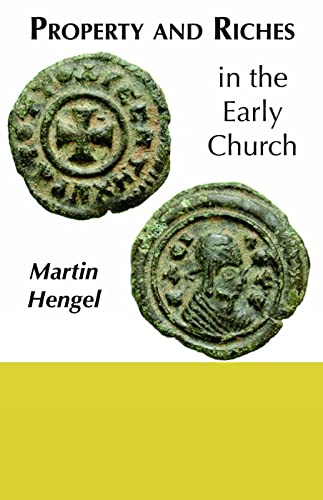Property and Riches in the Early Church
Written by Martin Hengel Reviewed By Udo W. MiddelmannInto the midst of the discussion over the place of property in today’s society appears this small volume by Martin Hengel, professor of New Testament and Early Judaism at the University of Tübingen. The author presents us with a wide compilation of sources that bear upon the subject of the relationship between man and matter, work and property.
The chapters indicate a breadth of research that Hengel has brought together to present us with ‘aspects of a social history of Early Christianity’. Considerable light is thus thrown on the varieties of angles from which the theme has been dealt with at a certain period of history. The reader will not only find relevant biblical texts, but also references to Greek philosophers, apocalyptic Christian writers and fourth-century fathers.
The subject is deliberately broadened by the author. The book does not set out to present the place of property in the New Testament. There is considerable value in this, for it presents one with an overview of a historical period and the ideas that did not disappear without certainly first leaving some mark on the culture of the Greek and Roman world.
Hengel traces some of the elements of property held in common to an established romantic regression of ‘back to nature’, a golden age prior to the fall when private property did not exist and man lived in a state of moral innocence, directed only by nature, which provided man equally and sufficiently with what he needed. This is seen as ‘by no means a genuinely Christian doctrine. Rather it is a mythical speculation about history which was widespread in antiquity’ (p. 7). Such ideas are relegated to be fundamental religious longings for the good old days. Only in connection with the Jewish heritage did these concerns of ancient reformers become a strong social impetus. Consequently, the ‘Jewish communities developed a system of welfare for the poor which was probably unique in antiquity’ (p. 20).
Professor Hengel understands the New Testament teaching on riches and property to be different and only marginally affected by theories of past Utopias. It is rather to be understood in light of the imminent establishment of the kingdom. This expectation demanded a freedom from possession that was the result of a complete trust in the goodness and providence of the heavenly Father. Jesus’ own criticism of riches was tempered by taking property in his own immediate surrounding for granted.
Hengel finds in the early church the attitude that ‘things of this age become inessential’, for the expectation of the return of Christ had made planning for the future meaningless (pp. 33, 34). A detachment from valuables was widespread because of the expectation of Christ’s return and the end of the world.
This little volume is valuable as an example of the effort and intent of much of modern rationalistic scholarship. Hengel expresses the hope that a reflection on the cultural and philosophical background of early Christianity and its origins will be of ‘exemplary significance’ and will thereby achieve ‘sufficient authority’ to give convincing answers today. This historical approach is valuable and enlightening due to the research involved. But more is demanded of it, when history is chosen to give value and meaning and direction in an age that has deliberately excluded any outside information, specifically information from God in a direct and therefore directive way. History itself cannot fulfil demands. History itself can only speak in the indicative, describing a situation. It cannot give us any imperative of action and no statement with ethical authority. Any contemplation of history can only lead to an accumulation of data, but not to values and action. History is always only a witness to itself, but not to the truth of the universe.
Professor Hengel admits to this, when in the concluding ten theses at the end he writes: ‘We cannot extract a well-defined Christian doctrine of property either from the New Testament or from the history of the early church’. Any concept of God’s revelation of truth into history remains unmentioned. In the absence of absolute patterns, history as the immediate reality of human existence leaves us with bare facts and no voice to speak into the social situation of our own day.
Udo W. Middelmann
Udo Middelmann is associated with Francis Schaeffer at L’Abri Fellowship, Switzerland.






